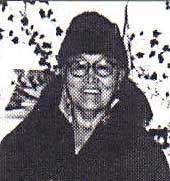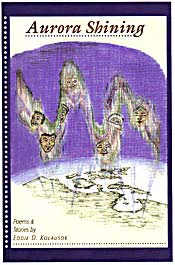|
Provenance welcomes it's newest columnist-journalist and arctic stories editor Mr. Eddie Dean Kolausok.
************
The Last Visit by the Little People
It occurred during a warm spring. An Inupiat family was visited by a Little Man, his Little Wife and one Little Boy. The Little Boy was called Inugukalik. While the Little People were inside the Inupiaq sod house it could be seen that the Little Boy was so small he could use a caribou ear for a skin parka. A caribou ear is only four inches or so - a little longer if from a bull. The Little Boy was playing outside and wandered close to where a husky dog was tied up. The dog, like most huskies, was instinctively a predator waiting for unsuspecting prey - even though he was fed by his owners. The dog silently waited until the small boy had come within range. The husky jumped swiftly and crunched the Little Boy in his jaws killing him instantly. The father of the Little Boy heard the muted cry of his little son and with super speed raced towards the dog with his wife behind him. The Little Man grabbed the husky dog with his powerful little hands and began to rip the dog apart limb by limb. The dog died a quick but brutal death. The dog must have thought that the Little Boy was a small animal as a husky would normally not attack a human. The Little Man and his Little Wife were in deep shock and deeply saddened by the incident. From then on Little People never visited Inupiat camps again. The strength of the Little People is often talked about and they are shy to be around regular sized human beings to this day.
(Note: This story was modified from Inuvialuit elder Ishmael Alunik's story, "Another Short, True Story Told By Many Inupiat and Inuvialuit," from his book
"Call me Ishmael:&nbps; Memories of an Inuvialuk Elder.")
Today some Inuit still speak of the Little People who live on the land. It is said that these mysterious Little People have purposely decided to avoid regular humans and that they have special powers which keep them from being identified. It is also said that one can only see them when they want one to see them. Tundra legend or Tundra Truth ... ask an Inuit Elder and you will likely hear more stories about the mysterious Little People of the Arctic.
[December 2004]
Return to more Arctic Short Stories and Poems from Provenance Magazine Arctic Journalist-Column
************
POEMS FROM THE ARCTIC
My Frozen Tears
Mom, I yelled,
As loud as a shivering snared rabbit.
She slipped out of my sight
Into the night
Beyond my reach,
Away from my screech.
All alone I stared
As the West Wind glared,
Acknowledging an ice blue sight.
Fight turned to fright
On that crisp cold Inuvik night.
Icicles pierced my eyes
As I longed to be near the comfort of her.
Stripped of her security.
Unable to enter the liquid oasis
Where confused souls lapped up false happiness,
It all vibrated with madness,
The crushing sadness
Had finally mutilated mom's gladness.
Too young to delegate blame,
I had no choice but to wait, watch, wonder, and worry in pain.
How insane!
Oh! The pain, the pain.
Like being lost in frigid waters,
I felt that only mom could pull me from
My Frozen Tears.
© 2004 Eddie Dean Kolausok,
YellowKnife, North West Territories, Canada
************
Other Publications & Writings of Eddie D. Kolausok
- Across Time and Tundra: The Inuvialuit of the Western Arctic by
Ishmael Alunik, Eddie D. Kolausok & David Morrison. Published by Raincoast
Books in partnership with the Canadian Museum of Civilization and the
University of Washington Press, ISBN I-55192-645-8
The book won the
following awards in 2004: Lela Common Award from the Canadian Writer's
Association; CLIO Award from Canadian Historical Association.
- "Call me Ishmael: Memories of an Inuvialuk Elder" by Ishmael Alunik.
Published by Kolausok Ublaaq Enterprises KUE, N.W.T. Canada, ISBN 0-9684571-0-X
CLICK to see back cover of this book with photos
of Inuit elder Ishmael Alunik at age 31 and 75 at his home in Inuvik, North West Territories NWT, Canada
- Aurora Shining
by
Eddie D. Kolausok. Published by KUE ISBN
0-9684571-1-8
************
Contact Eddie Kolausok at arctic-journalist@provenance.ca
************
Top of Page | Provenance.ca home |
************
|
|
Glossary-Dictionary of INUVIALUIT Words-Terms
Each native word-term below is followed by their English translation-meaning in quotation marks
-
Mahsi Cho "means thank you in the Gwich'in Dene language"
-
Alappaa "it's cold!"
-
Alii "an expression one uses when alarmed or fearing something"
-
Anaqanaallu "see you later"
-
Aqqali "an expression of unexpectedness, surprise, like saying wow"
-
Ata "listen"
-
Ilaanilu "see you sometime; good bye"
-
Ilaanniptauq "see you too"
-
Imaniittuaq "its like this"
-
Imanna "like this"
-
Kia "whose?"
-
Kia una "whose is this?"
-
Kiilu "again, some more"
-
Kina "who?"
-
Kina una "who is this?"
-
Nakinngaqpit "where from?"
-
Nani "Where?"
-
Nutim "in fact, actually"
-
Naung "where?"
-
Pipsaarung "do it again!"
-
Piung "go ahead and do it"
-
Qakugulu "see you soon, good-bye"
-
Quanuq "when?"
-
Qanuq "how?"
-
Qanuq akitutigivaa "How much does it cost?"
-
Qanuq ukiuqtutigiva "how old is he?"
-
Qanuq taivakpiung "What do you call it?"
-
Qanurviituq "It can't be helped! Too bad"
-
Qilamik "Hurry up!"
-
Qiqauniqtuaq "It's cold out!"
-
Quyanainni "thank you"
-
Suksaq "What for?"
-
Sulimava "What is he doing?"
-
Suliuqpa "What is he making?"
-
Sumi "Where?"
-
Sumiitpa "Where is he?"
-
Sumiutauvit "Where are you from?"
-
Sumukpaung "what time is it?"
-
Suna "What?"
-
Suna Una "What is this?"
-
Sunngituq "It doesn't matter: its Okay"
-
Suniaqpa "What shall he do?"
-
Suukiaq "I wonder why!"
-
Suuq "Why? Of How come?"
-
Suva
"What?"
- Suvit "What are you doing?"
-
Suvit uvva "What's the matter with you?"
-
Taima "That's all! Don't enough!"
-
Taimaniittuaq "it's like that"
-
Taimanna "like that"
-
Ubla akunlu "see you tomorrow!"
-
Ublaami "Good morning"
-
Uvva "here it is!"
SIGLITUN words that can be used around Christmas season:
-
Qitchirvik "Christmas"
-
Patquyaq "candle"
-
Uqummiaqataaq "candy"
-
Iqidjraq "angle"
-
Naguk "antler"
-
Mukpaq "ball"
-
Aviluraun "bell"
-
Kimmingnaq "cranberry"
-
Angaatdjuvik "church"
-
Qilaun " Drum Dance"
-
Kasaktuaq " Beats a drum"
-
Qilausiyaqtuaq " is drumdancing"
-
Akutuq " Eskimo ice cream"
-
Savaqutit "Jewels"
-
Atuqtuuyaqtuaq " plays music"
-
Qun'ngiq "Reindeer"
-
Quamutik "sled"
-
Atuun "song"
-
Ubluriaq "star"
The above is a working sample dictionary by
Provenance's Arctic Correspondent for
Inuvialuit words.
************
Useful Arctic Aboriginal-Native Cultural & Language Resources
- "Inuvialuit Cultural Resource Centre (ICRC), Inuvik N.W.T.
Languages in the Community | Goals and Objectives | Funding | Impacts and Effects
The Inuvialuit Settlement Region consists of six communities: Inuvik, Tuktoyaktuk, Aklavik, Holman Island, Sachs Harbour, and Paulatuk. The approximately 3500 Inuvialuit are Inuit who speak three dialects of Inuvialuktun." [quote fr.
website 041215]
http://www.pch.gc.ca/progs/em-cr/eval/2003/2003_01/11_e.cfm
- Gwich'in Social & Cultural Centre
Site in 3 official languages: English | Gwich'in | Français / French
[download the Dene font for your computer-web browser here!]
www.gwichin.ca
- Environmental changes influence Inuit health in the Canadian Arctic
"Through a 1.475 million dollar grant from the Canadian Institutes of Health Research - Institute of Aboriginal Peoples´ Health (CIHRIAPH), a Centre is being established for education, training and research on Inuit Health and Changing Environments based at the Public Health Research Unit, CHUL-CHUQ, Laval University (Quebec). This Centre is one of many being established in a network across the country by IAPH (ACADRE Program: Aboriginal Capacity and Developmental Research Environments) to address Aboriginal health training and research needs."
[website 2004/12/15]
www.nasivvik.ulaval.ca/en/index.htm
"Inuvialuit Ethnobotany: Exploring the Relationship between People and Plants in the Inuvialuit Settlement Region (ISR), Northwest Territories
Principal Researcher: Michael Salomons, (M.Sc., Conservation Biology) Manager of Research Programmes, Aurora Research Institute, Box 1450, 191 Mackenzie Road, Inuvik, NT X0E 0T0; Tel. (867) 777-4628;
"[quote website 041215]
www.nasivvik.ulaval.ca/en/research/project3.htm
- Aulavik National Park of Canada
AN AGREEMENT FOR THE ESTABLISHMENT OF A NATIONAL PARK ON BANKS ISLAND
Table of Contents
www.pc.gc.ca/pn-np/nt/aulavik/docs/plan1/index_e.asp
- North West Territories, NWT Literary Council
includes "status of aboriginal languages in the NWT" and
"statements of aboriginal language activists"
www.nwt.literacy.ca/aborig/land/contents.htm
- Aboriginal Arts and Culture
A major collection of website links for aboriginal information from around the world, including
Canada, USA, Mexico, Australia etc.
www.bloorstreet.com/300block/aborlart.htm
The two websites below are important sites as they are the main pages for both the
Gwich'in and the Inuvialuit in their hard work to preserve their languages:
************
see also
North West Territories Information
Yukon Territory Information
University of Alberta Law Students' Web Magazine
Canadian Historical Association
- www.cha-shc.ca/english/welcome.html
"...Founded in 1922 and fully bilingual, the Canadian Historical Association is a national organization dedicated to historical research and scholarship in all fields of history."
[quote fr. website 2004-12-14]
Canadian Council on Social Development Statistics & Information Reports Etc.
|

